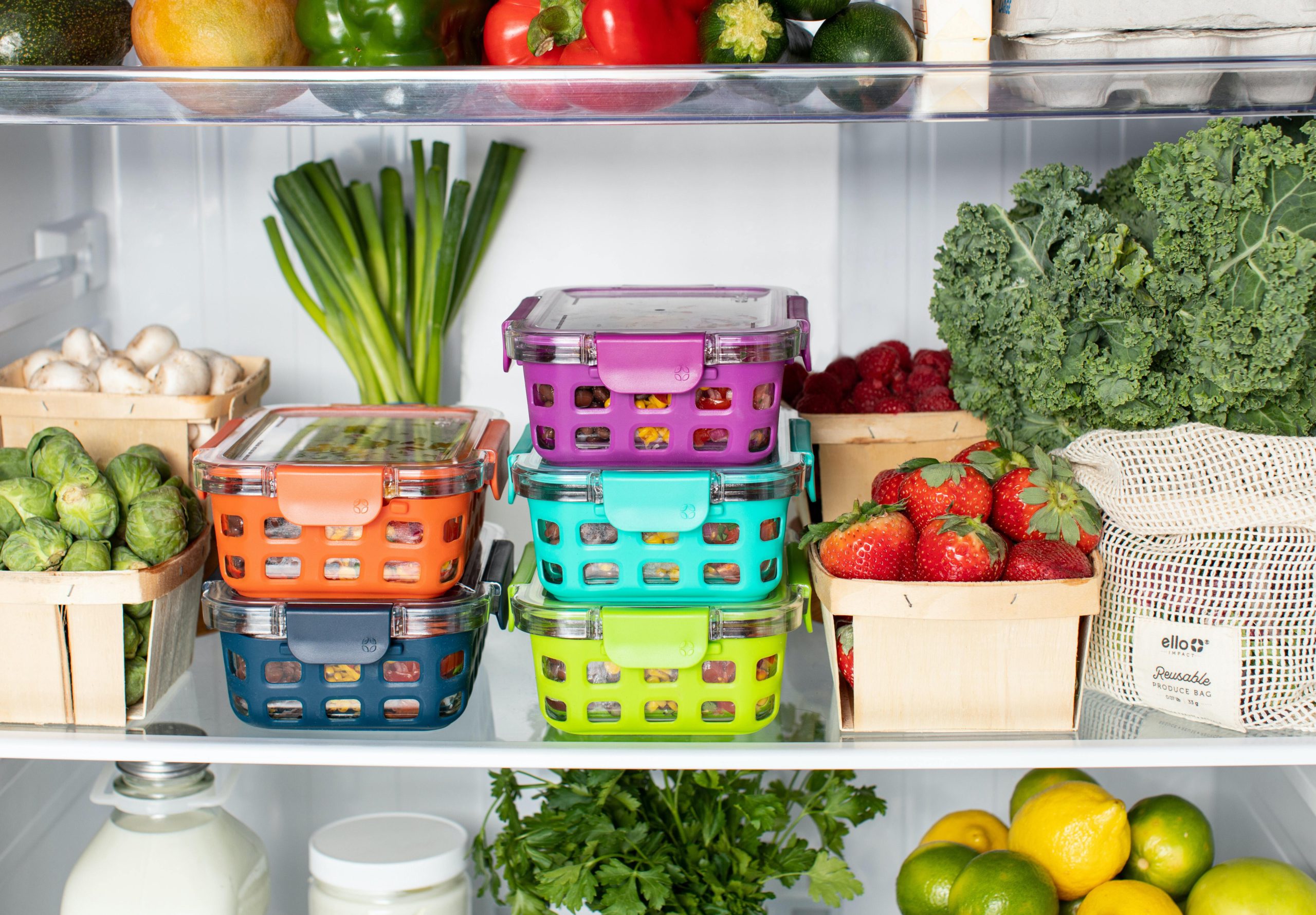How To Store Lemons, Oranges & Other Citrus
They’re a staple in virtually every kitchen, fridge or pantry. Citrus fruits such as lemons, oranges, mandarins, tangelos and others provide a sweet, tangy kick to your favourite dishes, salads, desserts, or all on their own.
We all know that citrus fruits are incredibly good for you. However, do you really know how to store lemons, oranges and other citrus fruits to get the optimal flavour and shelf life? There’s nothing worse than watching an orange shrivel up on the counter or discovering an old, mummified lemon rolling forlornly around the bottom of your fridge.
The good news is that with a few handy little hacks, you can ensure that you have fresh, perfectly juicy citrus on hand whenever you need it! Read on to discover:
- How to choose the best citrus fruit
- Counter Vs Fridge – The Great Citrus Storage Debate Solved!
- The best way to store citrus in the fridge
- Ninja secrets to helping citrus last longer out of the fridge
- Which storage method delivers the flavour that you savour
- What’s the deal with freezing citrus?
How To Choose The Best Citrus Fruits
Starting with the best fruit is the easiest way to boost your chances of a great tasting experience. Here are a few basic signs you should keep your eyes sharply peeled for (pun absolutely intended):
Vibrant Color: It’s common knowledge that we’re supposed to choose slightly green bananas and let them ripen at home. So, citrus should be the same, right? Ummmm, negative Red Leader! The banana tree is technically a herb, not a fruit plant, so the same rules definitely do not apply. Citrus fruits stop ripening and start decomposing the moment they’re picked. So, it’s vital to choose the fruit with the richest, deepest colour.
Thin Rind: For something so seemingly simple, the white, spongy inner peel surrounding the fruit sure has a lot of names. Known variously (in ascending order of impressiveness) as rind, pith, mesocarp and albedo, nature’s organic packaging provides a tell-tale sign that you’re onto a winner. Put simply, the thinner the rind, the juicier the fruit. Fruit with thinner rind is crammed with juice and hasn’t yet started to dry out.
Slightly Soft to the Touch: Go on, give your citrus a squeeze! If it has a little bit of give, without feeling mushy, you’ve hit the jackpot.
Smooth Skin: The perfect fruit will have a smoother outer skin with a glossy sheen, making it a cinch to identify. The odd blemish here or there is not a problem. However, rough, knobbly or shrivelled skin is a sure sign that the fruit inside has lost much of its moisture.
Should You Store Citrus On the Counter or in the Fridge? Solving the Great Debate
Ok, so maybe this one isn’t quite on the same level as MJ Vs LeBron, Brady Vs Montana or Ginger Vs Mary Anne. Nevertheless, it’s still a pretty hot topic. And, just like any great barroom controversy, there’s no single correct answer.
How you store your citrus ultimately depends on when you’re planning to consume it. A gorgeous fruit bowl on your kitchen counter or dining table can be a delightfully decorative burst of colour and fresh aromas. However, it doesn’t take a NASA astrophysicist to realise that fruit left out will be quicker to deteriorate.
Now that you’ve selected your perfect citrus using the techniques described above, the fruit should remain in peak condition on the counter for around 4-5 days at normal temperatures and humidity. So, the trick is to proudly display what you’re planning to eat or use in the next few days and pop the rest in the fridge. Which brings us to our next point…
What is the Best Way to Store Citrus in the Fridge?
Moisture is your citrus fruit’s mortal enemy. This is just as true inside your refrigerator. For this reason, the crisper draw is definitely your best option as it helps to keep out much of the condensation. The cold temperature and dry environment will help your fruit remain fresh and delicious for up to 4-5 weeks.
Of course, we couldn’t let it be that simple, so we put our crack team of citrus snoops on the case to see what other tidbits they could dig up. As usual, they did not disappoint. It turns out that people have studied this crucial topic and come up with an ingenious solution – Ziplocks! That’s right, throw your citrus into a Ziplock bag and remove as much air as possible before sealing. This sneaky little trick will add another couple of weeks of freshness to your fruit.
How to Keep Citrus Fresher for Longer Out of the Fridge?
If keeping your citrus in the fridge is not an option, then we still have a few tricks up our sleeve to eke a few extra days of freshness.
The first and simplest tip is to store it in a cool, dark place out of direct sunlight. If your pantry has a produce drawer, this is the perfect location.
If you’ve already tried this, you’ll know that it’s not a foolproof solution. Even in the cupboard, the skin can develop mould. You can keep the dreaded scourge at bay with a couple of easy strategies:
- The nubbly skin of citrus is the perfect place to trap moisture and breed mould, so wipe down the surface with a dry cloth or paper towel every couple of days.
- Rotate your fruit! Ever notice how it’s always the underside of the fruit that goes mouldy? Turn over your fruit every couple of days to ensure that moisture does not get trapped between it and other fruit or surfaces.
- It’s preferable not to stack citrus to ensure better airflow. If you must stack, then periodically restack them in a different order.
That’s Great, but Which Storage Method Gives Citrus the Best Flavour?
This one comes down to personal preference. Most people agree that citrus fruits have a sweeter, more intense flavour at room temperature. Conversely, there are few things more divinely refreshing than a cold orange or tangelo on a hot summer’s day.
One thing is for sure; If you’re juicing your citrus, room temp is always best. Cold temperatures harden the membrane that surrounds the juice, making it more challenging to extract. For best results, take your fruit out of the fridge the day or a few hours prior, then get juicing!
Can Citrus Be Frozen?
Frozen oranges are a spectacular summer treat for kids, but freezing citrus is not a long-term storage solution. The fruit will shrivel and dry out before too long. Some people report that it can last for a few months when cut into slices, but we find that the thawed product turns out a bit limp and gooey, so we don’t recommend it.
However, you may be surprised to learn that the zest is an exception to this rule! Zest your citrus and keep it in an airtight container in your freezer, and you can add a superb citrus kick to your favourite desserts or baked goods any time of year.
Speaking of which, If you’re like me and LOVE cooking with lemon, but have heart palpitations every time you see their price out of season, then we have a ludicrously simple hack for you. When they’re cheap and plentiful, buy up big, then squeeze a bunch of them and freeze the juice in ice cube trays. Whenever you’re making a recipe that calls for a hit of lemony tang, simply pop out a cube or two and voila! Genius!
There you have it, everything you never even knew you wanted to know about choosing, storing and using citrus fruits!
It goes without saying that the best citrus experience always starts with the highest quality, most delectable fruit. To find it, all you need to do is look for Dracula Citrus™ where superior Australian citrus is sold. With a star-studded lineup that includes blood oranges, navels, lemons, tangelos, & mandarins, one bite, and you’ll be hooked!








